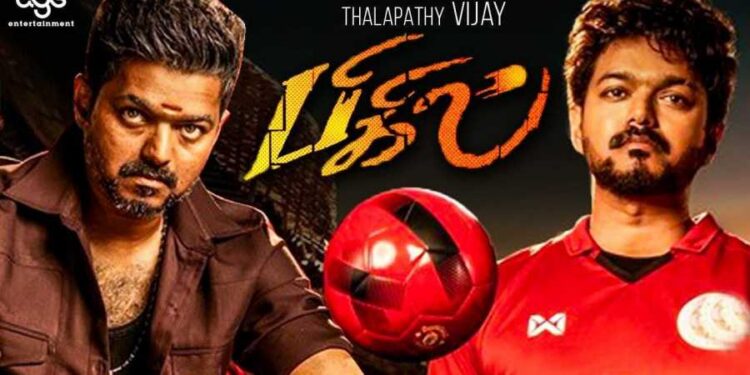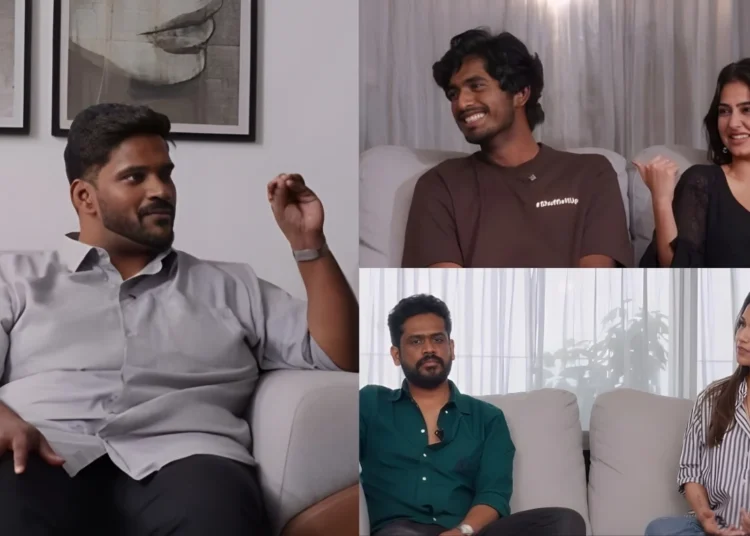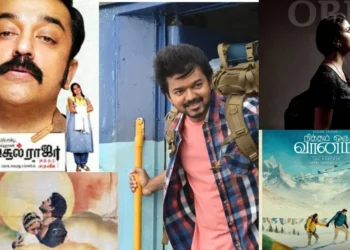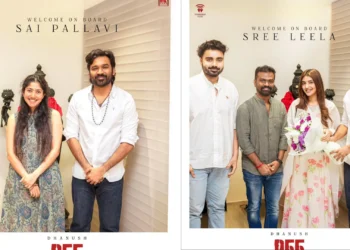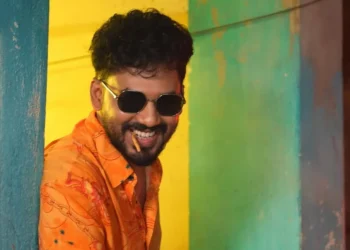This Bigil review contains spoilers…
Mersal, the previous collaboration between director, Atlee, and actor, Vijay, opened with a mystery. We see a number of people from the medical field get abducted one by one. Later, police officers burst into the Vijay character’s apartment flat and arrest him. But why? Who exactly is he? We’re made to wonder. The first flashback of the film details how we arrived at this point. And while it contained the usual Vijay-isms, including a comedic fight scene and a couple of pointless arm candies, there was still an underlying urgency to the sequences as well as a sense of importance and narrative flow (the assassination of the Hareesh Peradi character at the magic show added another layer to the “mass” mystery and there was a gut-wrenching story of a little girl as well). The rest of the film is equally as good. Mersal isn’t flawless, but Atlee strikes a good balance between ‘mass’ and ‘message’ to give us a spectacularly entertaining Deepavali bonanza. But I wonder how much of that balance also has to do with K. V. Vijayendra Prasad (Baahubali) who co-wrote the film’s screenplay.
I ask that because this time around, Atlee (who penned the screenplay of Bigil by himself) struggles to find that balance. Here he seems to be engaged in a never-ending tug of war with himself, unable to locate a middle ground between sports-oriented, women empowerment masala ala Dangal and typical Vijay mass. What we end up with is two completely different films — one about a gangster and the other about women’s football — that constantly invade each other’s space, neither able to reach its fullest potential. It’s a seesaw that feels lopsided in the wrong direction (though, I think most Vijay diehards will enjoy the direction it skews towards). But thankfully, the two “separate” stories are both engaging and fun in isolation even if they don’t quite intertwine seamlessly.

The first 20 minutes or so of Bigil is purely fan service. But unlike in Mersal, this time, there’s a steep hollowness to all of it. It feels purposeless as if Atlee just included them for the sole reason of giving fans something to cheer about without a care for narrative flow. A tonally serious college riot scene leads right into a comedic fight (a must for those who come out of Shankar’s school of filmmaking) that’s frankly quite deflating. Why not something with a little more blaze, especially since it’s an introduction to a gangster? There’s also the mandatory opening song. While ‘Verithanam’ isn’t a firecracker in the same vein as ‘Mersal Arasan,’ it’s always a pleasure to watch Vijay move and groove on the big screen. The dance number enhanced by G.K. Vishnu’s gorgeously dark cinematography (in parts, you see the backup dancers shrouded in red shadows, while Vijay has the spotlight on him) do a better job than the opening scene in showcasing Vijay as the bonafide STAR he is today. But of course, there’s also the needless comedic romance sequence. A lot of this made me feel a little restless.
But then the story picks up in a big way. We have to slog through deep mud to get there, but once we actually arrive at the part with two Vijays — one father and one son, one ageing gangster and one ring star-footballer — Bigil becomes a lot more enthralling. The origin story of how Michael goes from footballer to gangster is engaging albeit not very affecting because of how quick it is (it deserves to be its own film). Nevertheless, it leads to a heart-pumping interval fight scene that is absolutely Verithanam!
But it’s only in the second half do we get the movie that we actually want to see (or at least the movie that I wanted to see). Michael is appointed the coach of the talented but dysfunctional Tamil Nadu women’s football team. Part of the team: A woman with an eating disorder, an acid-attack survivor who has lost her confidence and spirit, a married woman whose family thinks women belong in the kitchen, not out on the field in shorts, etc. It’s their story, their struggle. Winning the coveted trophy would not only be a victory for them, but a victory for women all across — a symbol of hope and liberation. The training montage soundtrack, ‘Singgapeney’ brought tears to my eyes. The climactic action scene doesn’t involve Vijay dishing out some stylistic beatings against a bunch of goons but the ladies kicking the ball on the football field. Even the ‘massiest’ scene in the picture is given to the overweight footballer, Paandiamma, which received enormous cheers from the packed theatre crowd.
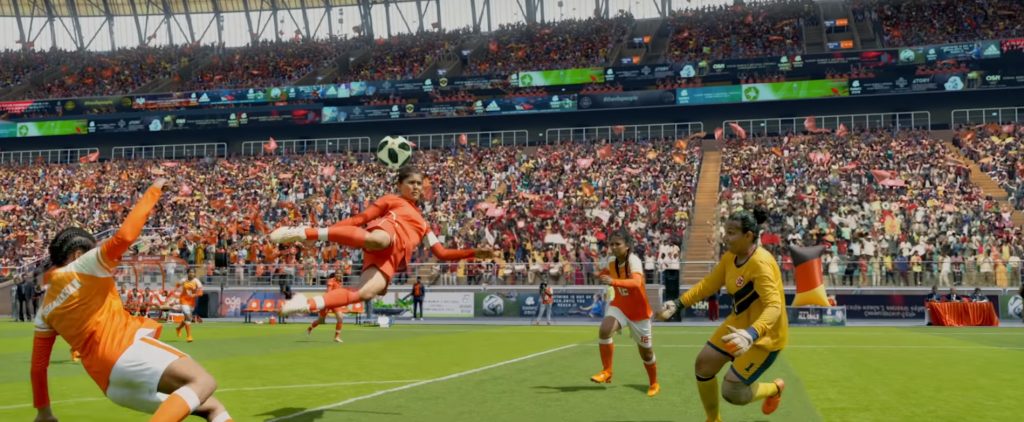
And Vijay? My word is he absolutely terrific as the coach. I believe this is the first time I have ever used the word ‘terrific’ to describe Vijay’s work as an actor, but I mean it. He sinks into his role and fires on all cylinders. Michael is a no-nonsense coach. The way he reprimands the girls after the first match genuinely caught me off guard. There is a controlled sense of ferocity in Vijay’s voice. It’s commanding without just loudly yelling. In the years of watching Vijay movies, I’ve never actually been shaken by his presence. This time I was, so much so that I wanted Michael to be the manager of Arsenal. At times he gives the girls the hairdryer treatment and you feel a little sad for them. But all of it comes from a place of genuine love. He wants them to be the best versions of themselves. There’s one point where he motivates a girl calmly but rousingly, with tears in his eyes. Underneath the ferocity there’s warmth. In this role, Thalapathy delivers a performance that is as convincing as his dance moves. Nayanthara too is elegantly cast. She’s not a dance piece but a physiotherapist with her own moments to shine.
Bigil has all the ingredients to be a genuinely great masala film. The problem is, a lot of the times, it’s dragged at its ankles by typical Vijay-isms. Don’t get me wrong — I love Vijay-isms. I love his two-hand wave, the punch lines, swagger and slow-motion action scenes. But here and especially in the second half, the generic mass sequences feel forced, out of place and come at the expense of developing the women characters. In the Aamir Khan-starrer Dangal, we sit with the little girls (and their adult versions), eat with them, listen to their interactions, watch them get repeatedly ridiculed by society, explore their thoughts, witness them be heroes in defeat and egoistic douchebags in victory, explore the dichotomy between daughters and father and the dynamic between the sisters. We watch them grow as human beings.
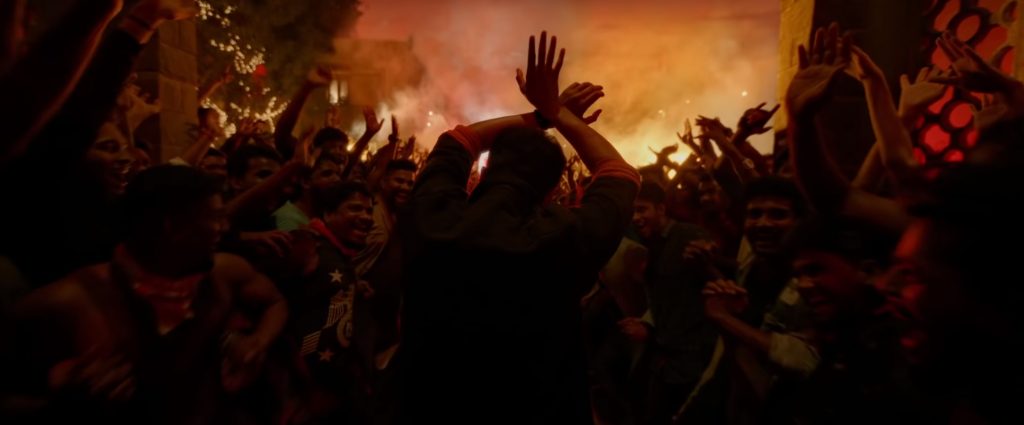
Here, the ladies represent ideas — ‘angry’, ‘married’, ‘obese’ etc — as opposed to being nuanced individuals with distinct layers. Instead of making an oppressive, conservative family suddenly turn progressive after Nayanthara gives (frankly generic) advice, why not make it an actual subplot? Because Atlee decided to dedicate precious screentime to two one-dimensional villain characters that keep interfering in Michael’s life just so there can be mass-y fight scenes and some one-liners.
The football scenes are a little disappointing as well. There’s no restraint. Every goal is scored spectacularly with bicycle kicks and flying volleys, so much so that after a while, it loses its impact. When everything is spectacular, nothing is. Why couldn’t the writing build towards one blockbuster strike? Perhaps we could’ve had a subplot about a striker who at the beginning of the journey had lost her edge and confidence. Maybe she keeps missing open goals and squandering golden chances, which then makes her more and more frustrated with herself. As the film progresses, we see her eventually find her mojo back and during the final minute of the final match, scores a superb bicycle kick brimming with emotional gravitas. But the film has no time for anything like this because of the needless threads with Jackie Shroff and Daniel Balaji.
That said, when Bigil is good, it’s bloody good! Early in the film, Rayappan tells his son something along the lines of “our community will have a brighter future, not because of Rayappan [me], not because of Michael [you], but because of Bigil.” ‘BIGIL’ isn’t just Michael’s nickname, it’s much more than that. It’s an idea. A symbol of determination and unwavering fighting spirit and an emblem of liberalisation. It’s pride! Honour! Vigour! It’s an incorruptible, untarnishable ideal we should all aspire towards. And at the end of the film, it isn’t Thalapathy Vijay who’s wearing that name on his back, it’s the women of Tamil Nadu’s football team who are on the pitch fighting not with machetes and their fists but through their abilities with the ball at their feet.
Bigil is currently playing in Malaysian cinemas.
The rating was increased slightly after a second viewing.
Follow us on Instagram, Facebook or Telegram for more updates and breaking news.


